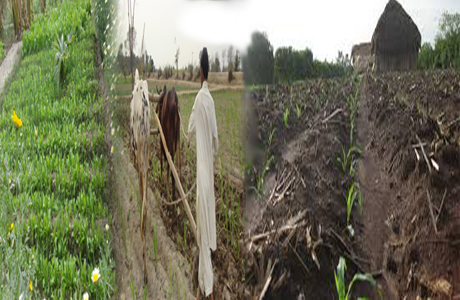Poor agri yields
By Editorials
 Pakistan-China
Joint Chamber of Commerce and Industry President Shah
Faisal Afridi emphasised the need to increase agricultural
yield through "eco-farming" with the objective of averting a
food crisis.
Pakistan-China
Joint Chamber of Commerce and Industry President Shah
Faisal Afridi emphasised the need to increase agricultural
yield through "eco-farming" with the objective of averting a
food crisis.
He urged the farmers to
adopt the Chinese cultivation model which focuses on hybrid
seeds, better water management.
An enhanced government
role for ensuring effective safety and support mechanisms
notably constructing food grain reservoirs as well as
public-private partnership to overcome the food crisis.
There is evidently no
question that China has emerged as a major farm producer.
And even though it accounts
for 10 percent of arable land world-wide it meets 20 percent
of world food demand.
So what exactly are the five
modernization policies that were proactively followed by the
Chinese government over decades and which, in turn, led to a
massive improvement in yield per hectare.
First in 1978, the Chinese government gave the
responsibility to decide what to produce from communes back
to individual farmers and gave each farmer a quota that was
to be given to his/her collective unit in return for
necessary implements and inputs.
In Pakistan the wide
difference between yield of the small number of rich
absentee landlords with large landholdings (who can afford
expensive technology and have the contacts to access credit.
Water and other inputs at
subsidised rates) and the large number of subsistence farmer
remains a major reason why national yields have not been
improved significantly over decades.
Second, the Chinese government engaged in irrigation
projects like the Three Gorges Dam.
However, studies indicate
that China's projected farm output would fall by 14 to 23
percent by 2050 due to water shortages predicted as a
consequence of climate change.
Pakistan as has been frequently noted by researchers is fast
becoming a water deficit country and it is extremely
unfortunate that there appears to be little focus by
Islamabad on engaging with India to resolving water issues.
In addition, there is an
urgent need to build water reservoirs.
Third, the Chinese government
also encourages mechanisation and use of fertilizer -
policies that have also been put forth by Pakistan;
However, a dearth of
resources and an inadequate focus on innovation as well as
the perennial issue raised by domestic fertilizer sector
namely whether to allocate scarce gas for electricity or
fertilizer manufacture have impeded greater use of
fertilisers in Pakistan.
Fourth, in 1984 the Chinese government liberalised farm
pricing and marketing.
In Pakistan the government
continues to exert control over pricing (support prices
which raises output of one crop and reduces output of
another) and marketing though its capacity to enforce
reasonable prices in city markets remains questionable.
Finally organic or as the President of PCJCCI stated
eco-farming has enabled the Chinese government to ensure
food safety, health benefits.
Export opportunities and as
per analysts the adoption of organics has assisted in
slowing down the migration of rural labour to cities.
Afridi also mentioned other environment-friendly techniques
in use in China:
For example, increasing rice
yields through duck farming in which ducks are raised on
rice paddies and fed on pests and weeds and in addition the
farmer has no need to use fertilisers as duck droppings are
an excellent fertilizer.
To conclude: there are numerous studies on farm models
undertaken by numerous researchers and submitted to
provincial governments for implementation.
However, the yield imbalance
between the rich and poor farmers remains and government
intervention in terms of support price has simply increased
the output of one crop at the cost of another.
Agriculture remains a major employer in this country and the
increasing stress on our cities already deficient
infrastructure due to migration from rural areas as well as
conflict zones can and should be dealt with through
appropriate agriculture reforms.
However, with vested
interests of the big landlords so heavily represented in our
assemblies this appears unlikely in the near future.
September, 2014
Source:
Business Recorder